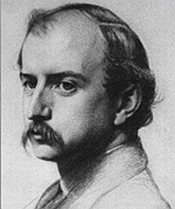 CRUEL SUMMER |
 Fall headfirst into July’s hottest stories—danger, desire, and happily-ever-afters await. | Henry Adams
Henry Brooks Adams (February 16, 1838 – March 27, 1918; normally called Henry Adams) was an American journalist, historian, academic and novelist. He is best known for his autobiographical book, The Education of Henry Adams. He was a member of the Adams political family. He was born in Boston, Massachusetts, the son of Charles Francis Adams Sr. (1807–1886) and Abigail Brooks (1808–1889) into one of the country's most prominent families.[1] Both his paternal grandfather, John Quincy Adams, and great grandfather, John Adams, one of the most prominent among the Founding Fathers, had been U.S. Presidents, his maternal grandfather was a millionaire, and another great grandfather, Nathaniel Gorham, signed the Constitution. After his graduation from Harvard University in 1858, he embarked on a Grand Tour of Europe, during which he also attended lectures in civil law at the University of Berlin. He was initiated into the Phi Kappa Psi Fraternity as an honorary member at the 1893 Columbian Exposition by Harris J. Ryan, a judge for the exhibit on electrical engineering. Through that organization, he was a member of the Irving Literary Society. In 1894, Adams was elected president of the American Historical Association. His address, entitled "The Tendency of History," was delivered in absentia. The essay predicted the development of a scientific approach to history, but was somewhat ambiguous as to what this achievement might mean. In 1904, Adams privately published a copy of his "Mont Saint Michel and Chartres", a pastiche of history, travel, and poetry, that celebrated the unity of medieval society, especially as represented in the great cathedrals of France. Originally meant as a diversion for his nieces and "nieces-in-wish," it was publicly released in 1913 at the request of Ralph Adams Cram, an important American architect, and published with support of the American Institute of Architects. He published The Education of Henry Adams in 1907, in a small private edition for selected friends. For Adams, the Virgin Mary was a symbol of the best of the old world, as the dynamo was a representative of modernity. It was only following Adams's death that The Education was made available to the general public, in an edition issued by the Massachusetts Historical Society. It ranked first on the Modern Library's 1998 list of 100 Best Nonfiction Books and was named the best book of the twentieth century[9] by the Intercollegiate Studies Institute, a conservative organization that promotes classical education. It was awarded the Pulitzer Prize in 1919. In 1912, Adams suffered a stroke, perhaps brought on by news of the sinking of the Titanic, for which he had return tickets to Europe. After the stroke, his scholarly output diminished, but he continued to travel, write letters, and host dignitaries and friends at his Washington, D.C., home. Henry Adams died at age 80 in Washington, D.C. He is interred beside his wife in Rock Creek Cemetery, Washington.
Log In to see more information about Henry Adams
SeriesBooks:History Of The United States Of America, July 1986Hardcover (reprint) |
|
|
| |||
|
||||



 © 2003-2025
© 2003-2025